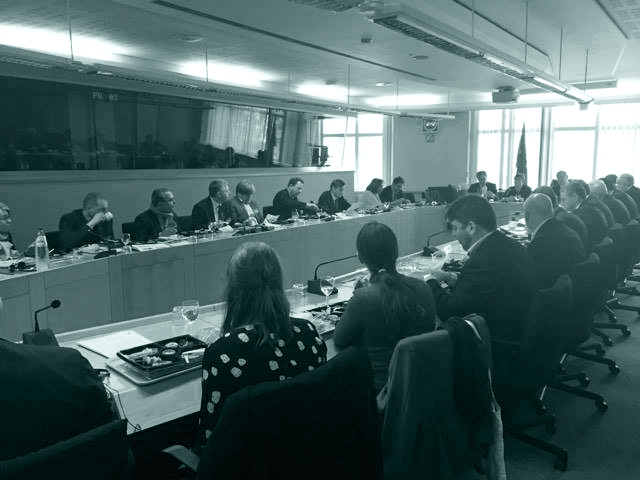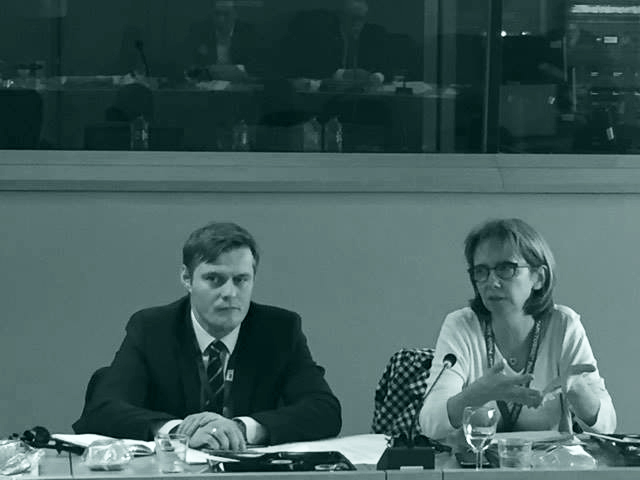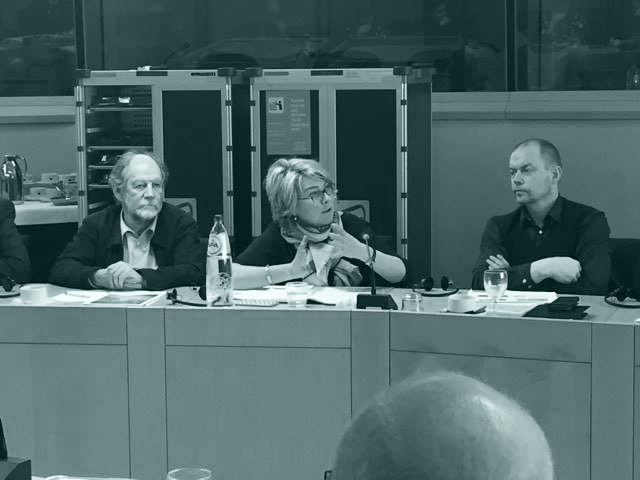BPO debate at the European Parliament – Baltic ports in the TEN-T network
On March 22, 2017, members of the European Parliament (EP), policymakers as well as port representatives and industry experts gathered in Brussels to take part in the annual lunch debate organized by the Baltic Ports Organization (BPO) at the seat of the EP. This year’s discussion focused on the place of the Baltic ports within the TEN-T network and its future outlook.
 Merja Kyllönen, Member of the European Parliament and BPO’s liaison, hosting the debate, opened the meeting and gave a short overview of what the EP is busy with right now with respect to transport issues. She focused on emissions from shipping, decarbonization and circular economy.
Merja Kyllönen, Member of the European Parliament and BPO’s liaison, hosting the debate, opened the meeting and gave a short overview of what the EP is busy with right now with respect to transport issues. She focused on emissions from shipping, decarbonization and circular economy.
Julian Skelnik, BPO Chairman, underlined the necessity of having the debates presenting the Baltic ports in the EP, their role in the TEN-T network and importance for EU economy.
Bogdan Ołdakowski, BPO Secretary General, took over and set the stage for the discourse, outlining the Baltic ports’ position on the current port market and in the TEN-T network in view of their role as a model region for green solutions.
In her introductory speech MEP Merja Kyllönen, former transport minister of Finland, highlighted the potential of circular economy in ports:
“Recently some of the biggest ports in Europe have been active with different circular economy initiatives in their harbours. These initiatives are actually something really natural for ports given their function as ‘matchmakers’ and crossing-points for all kind of waste and industrial flows and act as logistical hubs for the import and export of waste materials, which is why they are ideal places to further develop the circular economy”.
 Magda Kopczyńska, Director for Waterborne Transport at DG MOVE, presented a review of European Commission’s policy agenda impacting the transport and port sector including a review of the Port Reception Facility directive, Brexit consequences, trade facilitation, digitalization of transport and a discussion about global emission scheme and shipping.
Magda Kopczyńska, Director for Waterborne Transport at DG MOVE, presented a review of European Commission’s policy agenda impacting the transport and port sector including a review of the Port Reception Facility directive, Brexit consequences, trade facilitation, digitalization of transport and a discussion about global emission scheme and shipping.
She stated that the revision of the TEN-T Policy will take place in 2023, concluding that the EC is expecting a constructive dialogue with industry organizations when working on the above policies as well as the TEN-T Policy review.
Budgetary issues remained on the agenda with Wojciech Sopinski, Policy Officer at DG MOVE, taking the floor to describe port development projects within the Motorways of the Sea (MoS) programme funded through the Connecting Europe Facility (CEF). He underlined that almost all money has been already spent within the recent financial period (2014-2020). However, there is still some possibility to get grants from the CEF, including the recently opened Transport Blending Call.
Bogdan Ołdakowski, commenting on the topics surrounding the TEN-T policy and CEF, said:
“TEN-T policy has a big impact on ports. Apart from the recent CEF budget pool, there are two policy processes that we are particularly interested in. Firstly, it is the EU budget for the next financing period and for transport infrastructure in particular. Secondly, the TEN-T policy review ahead of us. We are glad to hear that the EC is open to discuss these items with industry organizations. In our opinion it is important to remember that maritime transport operates under stricter regulations regime in the Baltic compared to other EU seas, creating uneven market conditions”.
 The review of the TEN-T policy and questions surrounding the completion of the network are vital for the future of the port sector. Isabelle Ryckbost, European Sea Ports Organisation’s (ESPO) Secretary General, talked about the significance the review carries for the European ports and changes it brings to EU port maps.
The review of the TEN-T policy and questions surrounding the completion of the network are vital for the future of the port sector. Isabelle Ryckbost, European Sea Ports Organisation’s (ESPO) Secretary General, talked about the significance the review carries for the European ports and changes it brings to EU port maps.
Matters touched upon in the above speeches were then presented from the ports’ point of view. Björn Boström, CEO of the Port of Ystad and Chairman of the BPO Comprehensive Ports Group, commented on the experiences with TEN-T Policy and CEF funding from a comprehensive port’s perspective.
![Baltic Ports Organization]](/assets/template/img/bpo/logo.png)